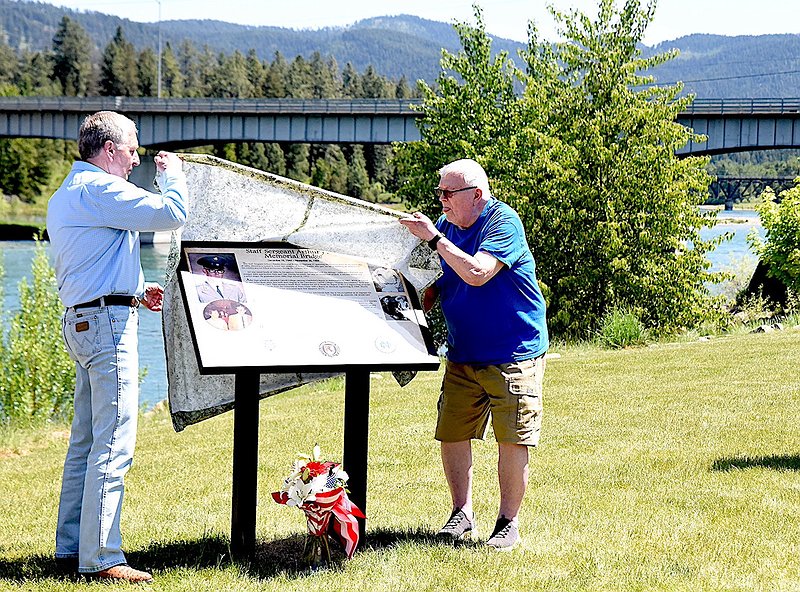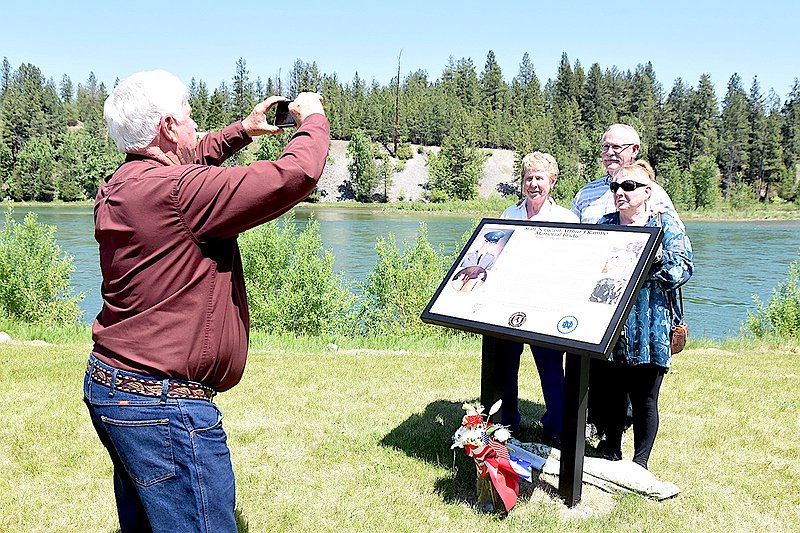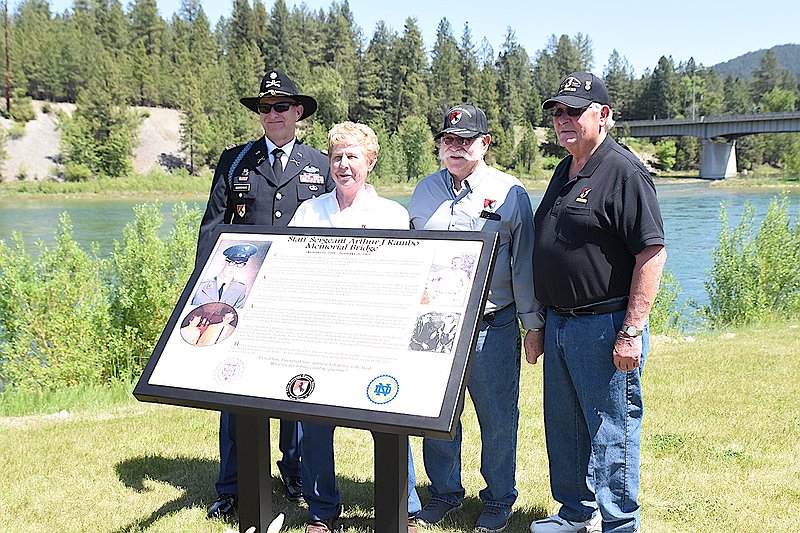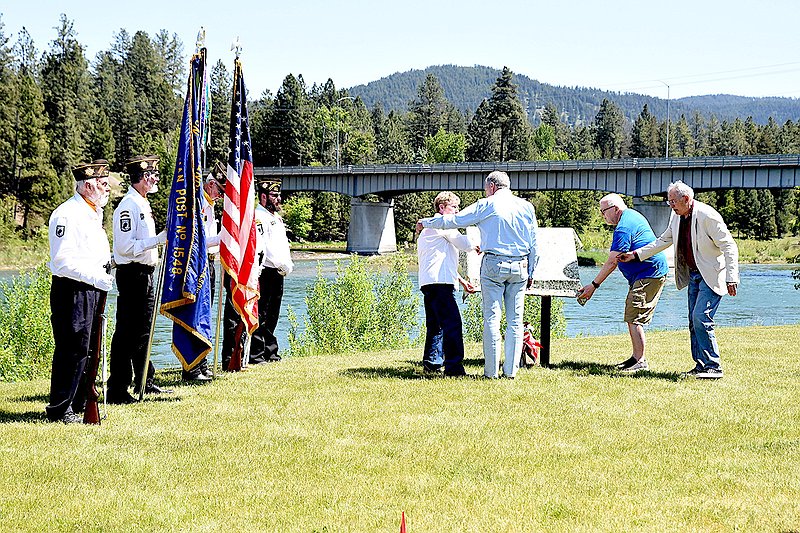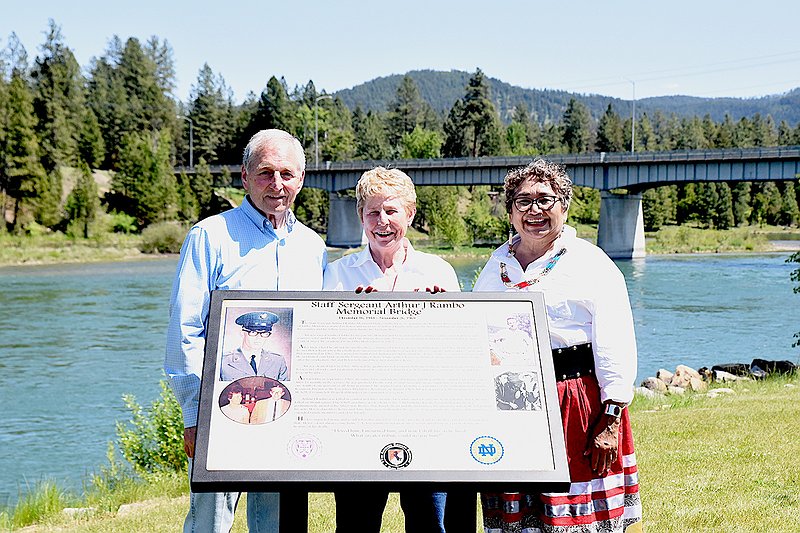Libby’s Rambo honored for sacrifice in Vietnam
Sunday’s dedication of the Staff Sgt. Arthur J Rambo Memorial Bridge in Libby brought together people from two countries and multiple generations.
That was the impact of a man who died serving his country 56 years ago in the Vietnam War in 1969.
Rambo was warmly remembered as an intelligent, talented athlete and singer. He had more than one opportunity to not take up arms in defense of his country, but that was not the kind of man he was.
Tony Smith, a former Troy educator and coach, who know works at Turning Winds in the Yaak, was the presenter.
“I graduated high school with Art and we both played on the same state championship baseball team,” Smith said. “I had been in Vietnam too, but was out of the service when Art died and I served as a pallbearer at his funeral.
“In my eyes, Art’s heroism is no less significant than those who landed on Normandy Beach in World War II.”
Rambo served in the Blackhorse 11th Armored Cavalry Regiment near the Cambodian border. Traveling from Arizona, California, Illinois and Nebraska, several members of the 11th Armored were present at Sunday’s ceremony and hundreds of them across the country wrote letters of support for the memorial.
Following his death, he was returned home and buried the day before his 25th birthday.
Rambo was posthumously awarded the Silver Star, the Bronze Star, a Purple Heart and the Vietnamese Presidential Citation for his actions in the mortar attack that his unit came under that day.
Besides his immediate family, extended family and many friends, he left behind his wife Helen Ryan Rambo and his two daughters Kerry and Amy, both under the age of two when their father was killed in action.
Rambo was born Dec. 16, 1944, in Seattle. His family moved to Libby in 1948 and his parents, Howard and Viola, worked for the U.S. Forest Service.
He graduated in the top 10 of his class from Libby High School in 1963. He then earned a degree in mathematics from Carroll College plus a chemical engineering degree from Notre Dame. He married Helen Ryan in 1967 and they had two children - the youngest was born after he arrived in Vietnam.
Texaco Oil Company also offered him a position with a guaranteed draft deferment. Since he was expecting the birth of his first child, Kerry Lynn, later in June and because he felt he could serve his country, and his family, equally well as a chemical engineer with Texaco, Rambo opted to sign with Texaco, a decision he didn't take lightly.
Rambo wanted to learn the oil business from the bottom up. With this decision in place, Rambo started his career toiling in the oil fields of Golden, Colorado as a roustabout.
A commendation for Rambo when he posthumously received the Silver Star for his actions on that fateful day explained his actions.
“Sgt. Arthur John Rambo, United States Army, was serving as an artilleryman with the Howitzer Battery, 3rd Squadron, 11th Armored Calvary Regiment, in the Republic of Vietnam when his squadron command post came under intense mortar and ground attack from a North Vietnamese Army force.
“A rocket-propelled grenade slammed into a cargo vehicle next to him and erupted into fire. Sgt. Rambo immediately began alerting personnel and directing them away from the area. He then crawled to the burning vehicle and attempted to drive it out of the area. Suddenly another grenade hit the vehicle and he was thrown to the ground.
“Undaunted, he crawled to a self-propelled howitzer and started the engine. The vehicle was hit by another rocket-propelled grenade and he was fatally injured.
“Sgt. Rambo’s heroic actions were in keeping with the highest traditions of military service and reflect great credit upon himself, his unit and the United States Army.”
The Silver Star is the third highest medal awarded in the military.
Mark Fennessy, a 1965 graduate of Libby High School, was visiting with Libby VFW Harper Erdman Post 1548 Assistant Commander Keith Kidwell last year.
“When I’m traveling I see a lot of bridges named after soldiers or law enforcement officers who have died in service and Art was one of the first from Libby to die in Vietnam, so we talked a bit about doing something for him.”
Sen. Mike Cuffe carried the bill to have the Kootenai River Bridge named in Rambo’s honor but wasn’t able to make the ceremony due to prior family commitments in Kentucky.
Rep. Neil Duram spoke of his pride in being part of the process that named the bridge in honor of Rambo.
“It’s been an honor to get to know Arthur through the writings about him,” Duram said. “I was able to carry the bill to the House of Representatives and Sen. Cuffe wanted to thank Tony for his work in getting support for this bill.”
Sen. Susan Webber, a Browning resident who represents parts of four counties in Northwest Montana, was invited by Art’s sister, Patty Rambo, to be part of the dedication.
“I am a war mother,” Webber said. “My son served in Iraq and Afghanistan, my dad is a Vietnam vet and my husband was also in the military, so when Patty asked me to come, I didn’t hesitate.”
She said the passage of the bill was one of the quickest she’s seen.
“Art is home and this bridge will memorialize him forever,” Weber said.
For Patty Rambo, throughout the process, she sought accuracy when it came to the details of her brother, his life, his family and his death.
“It was important that this was done with accuracy,” Patty said. “He told his wife he’d be back and he wouldn’t try to be a hero. Art died simply doing his job.”
Patty said the process of having the bridge named in her brother’s honor dredged up a lot of old feelings.
“I don’t feel at peace, but I was overwhelmed and very appreciative of the number of people who did attend,” she said. “Having Tony Smith, who I’ve known since grade school, lend his personal touch and professionalism really meant a lot to me.”
Eli Miller, Senior Vice Commander of VFW Post 1548 in Libby, read the names of five Libby residents who died in the Vietnam War from 1967 to 1969. They included Lt. Edward Norman Letchworth (Feb. 27, 1967), Pvt. 1st Class Lester Wesley Johnson, Jr. (Feb. 8, 1968), Sgt. Robert Edward Welch (May 13, 1968), Specialist Four Steven L. Byington (July 13, 1968) and Staff Sgt. Arthur J Rambo (Nov. 26, 1969).
“We’re appreciative of their service and ultimate sacrifice,” Miller said.
Montana Gov. Marc Racicot, who grew up in Libby, also attended the ceremony and unveiled the monument with Libby teacher Marv Sather.
“The dedication of the bridge remembers Art,” Racicot said. “But it is also a tribute to all those impacted by the Vietnam War.”
After hearing the news of Art’s death, Racicot wrote a poem on a piece of school paper.
“What he leaves us is a piece of himself, a family graced with his presence, a world awed by his touch and a friend adorned with his friendship,” he wrote. “These things shall never die. And because they are him, he lives forever within us.
"And now, I shall live as he lived,” Racicot wrote. “What greater tribute could we pay him?”







